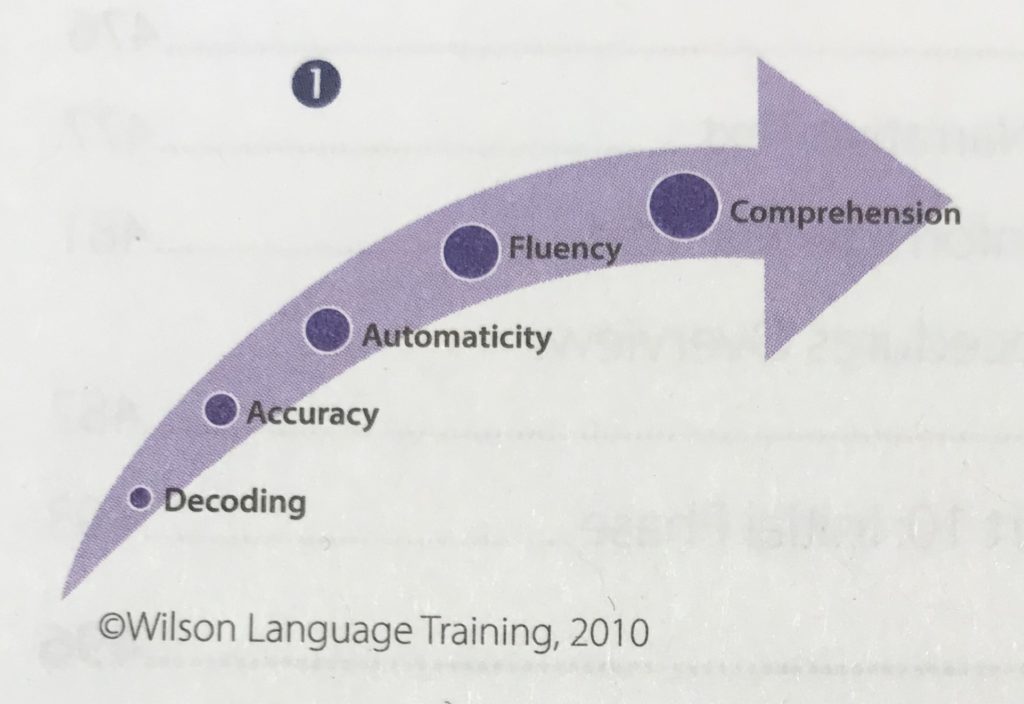I have attended many IEP meetings where the reading goal is fluency (words per minute read), and the child has yet to master their letter sounds and the ability to decode unknown words.
Fluency cannot be a goal if the child has not yet mastered the skills that come before fluency: 1) letter sound knowledge, 2) decoding, 3) individual word reading accuracy and 4) automaticity. All facets most flow before fluency and comprehension can be attained.
The problem with reading instruction in our schools is that fluency has become the ultimate and only measurement goal. This evolved for two reasons. First, studies showed that students had to be fluent readers to comprehend what they were reading. Thus words read correctly per minute became the focus. Second, reading curriculums vastly de-emphasized systematic phonics and decoding instruction, so that even the teachers of reading, could not teach children how to decode words and mold them into accurate readers. They could only point to the word, and say to the child “this word is navy” and never explain why the letter a in that word is saying its long sound, without the silent e, and why the letter y in that word is saying the long e sound. For some kids, this instruction is literally imperative before they can ever achieve fluency.
I tutor children who struggle with reading. For the past nine years, I have seen over 100 children who are being pushed to hit unrealistic fluency goals, when their word reading accuracy and decoding abilities are in the 1-10 percentile range. These children develop anxiety over reading because no one ever tested them to see if they had mastered letter sounds, decoding and word-reading accuracy before assigning them a fluency goal. Some of my students have even had to move to homeschooling because of severe anxiety over the lack of reading instruction they were receiving, and the inability of our schools to examine WHY they were not fluent. If a child cannot achieve a fluency goal, then they have weaknesses in the building blocks prior to fluency that must be addressed.
If your child is struggling with reading fluency, if they are being pressured to read faster and they struggle with accuracy, begin to investigate! They may have not mastered the building blocks needed to attain fluency. How will you know this? Check out the article below:
“10 Questions to Ask If Your Child Struggles With Reading” or take this free dyslexia screen. 80% of children who struggle with reading have undiagnosed dyslexia. Your child’s reading success should be measured on more than fluency. It should be measured on:
1) letter-sound knowledge
2) ability to use phonics knowledge to decode words
3) vocabulary knowledge
4) sight word proficiency
5) spelling ability
6) sentence reading accuracy and passage reading accuracy (this should be at 97% word accuracy before fluency can be a goal).
If they are proficient in these skills, then fluency can be a goal. If they are not reaching their fluency goals, ask your child’s teacher about his/her abilities in the skills listed above. If they don’t know, tell them you want these skills measured and results to be given to you. If a child cannot read a passage at an accuracy rate of 97%, they can not achieve fluency goals with that passage.
Children need to have solid building blocks upon which to build fluency!

Author: Heidi Stoffel, Wilson Dyslexia Practitioner, Executive Director of Aspire Academy and a founding member of Decoding Dyslexia Iowa.

